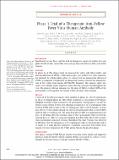Phase 1 Trial of a Therapeutic Anti–Yellow Fever Virus Human Antibody
Author(s)
Low, Jenny G; Ng, Justin HJ; Ong, Eugenia Z; Kalimuddin, Shirin; Wijaya, Limin; Chan, Yvonne FZ; Ng, Dorothy HL; Tan, Hwee-Cheng; Baglody, Anjali; Chionh, Yok-Hian; Lee, Debbie CP; Budigi, Yadunanda; Sasisekharan, Ram; Ooi, Eng-Eong; ... Show more Show less
DownloadPublished version (526.8Kb)
Publisher Policy
Publisher Policy
Article is made available in accordance with the publisher's policy and may be subject to US copyright law. Please refer to the publisher's site for terms of use.
Terms of use
Metadata
Show full item recordAbstract
Copyright © 2020 Massachusetts Medical Society. BACKGROUND Insufficient vaccine doses and the lack of therapeutic agents for yellow fever put global health at risk, should this virus emerge from sub-Saharan Africa and South America. METHODS In phase 1a of this clinical trial, we assessed the safety, side-effect profile, and pharmacokinetics of TY014, a fully human IgG1 anti–yellow fever virus monoclonal antibody. In a double-blind, phase 1b clinical trial, we assessed the efficacy of TY014, as compared with placebo, in abrogating viremia related to the administration of live yellow fever vaccine (YF17D-204; Stamaril). The primary safety outcomes were adverse events reported 1 hour after the infusion and throughout the trial. The primary efficacy outcome was the dose of TY014 at which 100% of the participants tested negative for viremia within 48 hours after infusion. RESULTS A total of 27 healthy participants were enrolled in phase 1a, and 10 participants in phase 1b. During phase 1a, TY014 dose escalation to a maximum of 20 mg per kilogram of body weight occurred in 22 participants. During phases 1a and 1b, adverse events within 1 hour after infusion occurred in 1 of 27 participants who received TY014 and in none of the 10 participants who received placebo. At least one adverse event occurred during the trial in 22 participants who received TY014 and in 8 who received placebo. The mean half-life of TY014 was approximately 12.8 days. At 48 hours after the infusion, none of the 5 participants who received the starting dose of TY014 of 2 mg per kilogram had detectable YF17D-204 viremia; these participants remained aviremic throughout the trial. Viremia was observed at 48 hours after the infusion in 2 of 5 participants who received placebo and at 72 hours in 2 more placebo recipients. Symptoms associated with yellow fever vaccine were less frequent in the TY014 group than in the placebo group. CONCLUSIONS This phase 1 trial of TY014 did not identify worrisome safety signals and suggested potential clinical benefit, which requires further assessment in a phase 2 trial.
Date issued
2020Department
Singapore-MIT Alliance in Research and Technology (SMART); Massachusetts Institute of Technology. Department of Biological EngineeringJournal
New England Journal of Medicine
Publisher
Massachusetts Medical Society